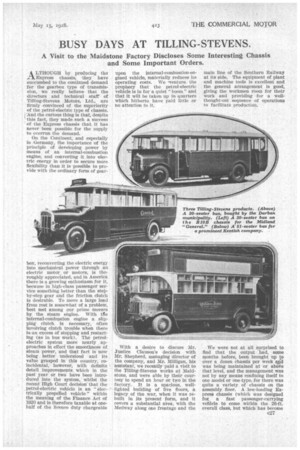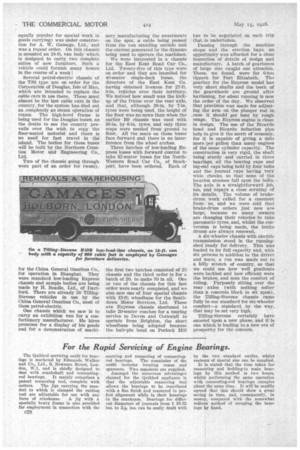BUSY DAYS •AT T1LLING-STEVENS.
Page 49

Page 50

If you've noticed an error in this article please click here to report it so we can fix it.
A Visit to the Maidstone Factory Discloses Some Interesting Chassis and Some Important Orders.
A LTHOUGH by producing the _LA Express Chassis, they have suceumbed to the continued demand for the gearbox type of transis-' sion, we really believe that the directors and. technical staff of Tilling-Stevens Motors, Ltd., are firmly ,convinced of the superiority of the petrol-electric type of chassis. And the curious thing is that, despite this fact, they made such a success • of the Express chassis that it has never been possible for the
supply to overrun the demand.
On the Continent, and especially in •Germany, the importance of the principle of developing power by means of an • internal-combustion engine, and converting it into electric energy in order to secure more flexibility than it is possible to provide with the ordinary form of gear box, reconverting the electric energy into mechanical power through an electric motor or motors, is thoroughly appreciated, and in America there is a growing enthusiasm for it, because in high-class passenger service something better than the stek by-step gear and the friction clutch is desirable. To move a large load 'from rest is somewhat of a problem, best met among our prime movers by the steam engine. With tile internal-combustion engine a slipping clutch is necessary, often Involving. clutch trouble when there is an excess of stopping and restarting (as in bus Work). The petrolelectric system more nearly approaches in effect the smoothness of steam power, and that fact is now being better understood. • and its value grasped in this country, coincidental, however, with definite detail improvements which' in the past year' or two have been Introduced. into the system," whilst the recent High Court decision that the petrol-electric vehicle is an "electrically propelled vehicle" within the meaning of the Finance Act of 1920 and is therefore taxable at onehalf of the licence duty chargeable
upon the internal-combustion-englued vehicle, materially reduces its operating costs. We 'venture, the prophecy that the petrol-electric vehicle is in for a quiet " boom " and • that it will be taken. up in quarters which hitherto have paid little or no attention to it,
With a desire to discuss Mr. Justice Clauson's decision with Mr: Shepherd, managing director of the company, and Mr. Milligan, his 'assistant, we recently paida vlsit to the Tilling-Stevens works at Maidstone, and were able by their courtesy to spend an hour or two in the factory. It is a spacious, well. lighted building of five floors, a legacy of the .war, when it was rebuilt in its present form, and it covers a substantial area, with the Medway along one frontage and the
main line of the Southern Railway at its side. The equipment of plant and machine tools is excellent and the general arrangement is good, giving the workmen room for their work and providing for a wellthought-out sequence of operations to facilitate production.
We were not at all Surprised to find that the output 'had, some months before, been brought up to over a dozen chassis per week and was being maintained at or above that level, and the management was not by any means confining itself to one model or one •type, for there was quite a variety, of chassis on the assembly floor. A low-loading Express chassis (which was designed for a fast passenger-carrying vehicle to come within the 26-ft. overall class, but which has become
equally popular for special work in goods carrying) was under construction for A. W. Gamage, Ltd., and was a repeat order. On this chassis is mounted an 18-ft. van body which is designed to carry two complete suites of new furniture. Such a vehicle could furnish many homes in the course of a week I Several petrol-electric chassis of the TS6 type are on order for the Corporation of Douglas, isle of Man, which are intended to replace the cable cars in use there. These mast almost be the last cable ears in the country, for the system has died out as .completely as steam operation of trams. The high-level frame is being used for the Douglas buses, as the desire to see the country prevails over the wish to copy the floor-seated motorist and there is no need for fast travel in the island. The bodies for these buses will be built by the Northern Counties Motor and Engineering Co., Ltd.
Two of the chassis going through were part of an order for twenty, for the China General Omnibus Co., for operation in Shanghai. They were standard low-loading Express chassis and sample bodies are being made by H. Beadle, Ltd., of Dartford. There are already 50 TillingStevens vehicles in use by the China General Omnibus Co., most of them petrol-electric.
One chassis which we saw is to • carry an exhibition van for a confectionery manufacturer, He hires premises for a display of his goods and for a demonstration of machi nery manufacturing the sweetmeats on the spot, a cable being passed from the van standing outside and the current generated by the dynamo being used to operate the machines.
We were interested in a chassis for the East Kent Road Car Co., LW. Twenty-five of this type were on order and they are intended for 40-seater single-deck buses, the directors of the East Kent Co. having obtained licences for 27-ft. 6-in, vehicles over their territory. We noticed how small was the kickup of the frame over the rear axle, and that, although 38-in. by 7-in. tyres were being used, the height of the floor was no more than when the earlier B9 chassis was used with 36-in. by 6-in, tyres, and only three steps were needed from ground to floor. All the seats on these buses face forward and there is no interference from the wheel arches.
Three batches of low-loading Express buses with forward control to take 32-seater buses for the NorthWestern Road Car Co., of Stock-port, have been ordered. Each of
the first two batches consisted of 25 chassis and the third order is for a batch of 20, to make 70 in all. One or two of the chassis for this last order were nearly completed, and we also saw one of four special chassis with 13-ft. wheelbase for the Southdown Motor Services, Ltd. These are Express chassis shortened to take 20-seater coaches for a touring service to Devon and Cornwall to operate from Brighton, the short wheelbase being adopted because the hair-pin bend on Porlock Hill has to be negotiated on each trip that-is undertaken.
Passing through the machine shops and the erection bays, an opportunity was afforded for a close inspection of details of design and manufacture. A batch of gearboxes of large size caught our attention.
These, we found, were for 6-ton tippers for Port Elizabeth. The gearbox for the Ex-press model has very short shafts and the teeth of the gearwheels are ground after hardening, for silent running is now the order of the day. We observed that provision was made for adjust ing the arm on the plunger rod in _case it should get bent by rough usage. The Express engine is clean in design: The use of the Ricardo head and Ricardo induction pipe help to give it the merit of economy, for it is capable of giving a mile more per gallon than many engines of the same cylinder capacity. The construction is very rigid, the shaft being sturdy and carried in three bearings, all the hearing caps and big-end caps being held by four bolts and the journal caps having very wide cheeks, so that none of the location stresses fall upon the bolts. The axle is a straightforward job, too, and repays a close scrutiny of its details. The volume of brakedrum work called for a comment from us, and we were -told that brake-drum orders just now are large, because so many owners are changing their vehicles to take pneumatic tyres, and, whilst the conversion is being made, the brake drums are always renewed.
A six-wheeler chassis with electric transmission stood in the running shed ready for delivery. This was
loaded to its full capacity and, with six persons in addition to the driver
and mate, a run was made out to
a hilly stretch of country, so that we could see how well gradients
were tackled and how efficient were the brakes, and note the comfort of riding. Purposely -sitting over the rear axles (with nothing softer than •a concrete block to sit upon), the Tilling-Stevens chassis came fully to our standard for six-wheeler comfort—a standard, by the way, that may be set very high.
Tilling-Stevens certainly have entered upon a new phase, and it is one which is leading to a new era of prosperity for the concern.












































































































